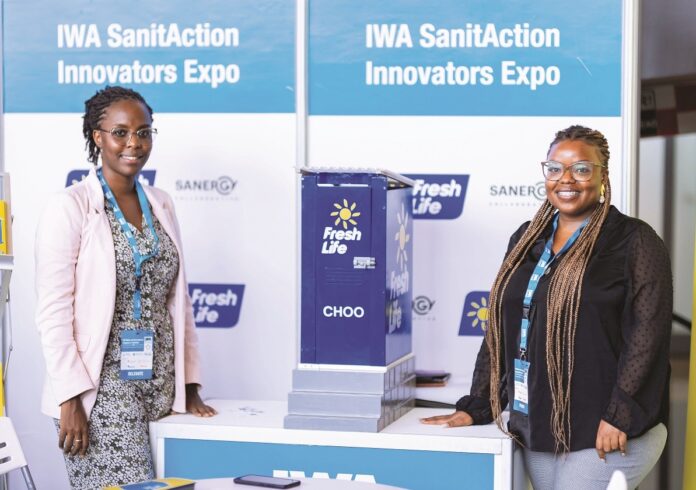One first at IWA’s Water and Development Congress & Exhibition was the staging of the Innovation Acceleration Forum, focused on the many opportunities for sanitation. Persis Ramírez reflects on the event’s success.
From ventilated improved pit (VIP) latrines to composting toilets, technological innovation has been driving increased access to sanitation in Africa for decades. As a sector, we recognise the necessity of bringing forward new technologies to close the sanitation service gap, especially in urban contexts. Nonetheless, it is not common to come across a dedicated global platform where this topic is the central point of discussion.
IWA’s Innovation Acceleration Forum 2023 took place in Kigali, Rwanda, and was a groundbreaking event focused on placing innovation in sanitation front and centre of the global agenda. The Forum was integral to IWA’s Water and Development Congress & Exhibition and – in its inaugural edition – focused on the dynamic African sanitation landscape, providing a space for recognition, discussion and reflection.
It is difficult to summarise in one article the many valuable insights from keynote speakers, moderators, panellists, innovators and participants who made this event an outstanding success, but having to identify key takeaways from the Forum, here is my take on the main issues discussed.
“The return on investment for sanitation stands at $21 for every dollar spent”
Innovation vs regulation
As with anything else in society, innovation needs an enabling structure. However, regulating innovative technologies in the sanitation sector is quite challenging, mainly because, by the time guidelines, policies, standards and procedures are approved, new technologies have already replaced the ones they were intended to govern. So, it is difficult for regulators to keep up. This delay is quite daunting and anticlimactic for all parties involved.
Should innovation lead regulation instead?
Discussions in the Forum did not arrive at a one size fits all solution, and would not have been expected to have done so. That said, consensus was achieved in the room when collaborative approaches were introduced. Yes, our governing institutions may be archaic and lack ‘readiness’ to fully embrace innovative technologies, but being able to ‘work with Goliath’ has proved to be a necessary step in normalising standards for the sanitation market.
A refreshing take at the Forum was the powerful influence communities of academia and practitioners can have in flipping this reality entirely. Raising the question: ‘If regulation is hindering innovation, can the reverse effect be achieved?’ In the words of Doulaye Kone, deputy director for water, sanitation and hygiene at the Bill & Melinda Gates Foundation, the sanitation community has the power to leverage change: “This is a time to signal to industry what the future will look like. Standards are not just restrictions. They can be designed to drive innovation and to regulate for safety.”
Innovation is enriched by diversity
Frequently, when we encounter statistics such as ‘seven out of 10 people in Africa lack safely managed sanitation services’, we envision a one size fits all blanket solution and overlook the unique social, cultural, financial and environmental needs of each community within this continent. The significance of diversity in propelling innovation as an ongoing process was vividly demonstrated in the second session of the Forum, entitled ‘Women and Youth-led Sanitation Innovation’. As Chaiwe Mushauko-Sanderse, founder of CaDev_Capacity Development, aptly articulated: “Innovation is a diverse word… it takes on different forms.”
The panellists in this session exhibited a remarkable level of intersectionality in their interventions, fearlessly delving into challenging topics. From integrating the perspectives of young people and women to addressing issues such as language barriers and accessibility gaps, this session highlighted disruptive initiatives that deliver both technological and social innovation.
An equally impressive testimony to how innovation has driven inclusive solutions for sanitation in Africa were the demonstrations of digital technological innovations. From virtual reality experiences illustrating how faecal sludge gets treated, to local sanitation service providers’ mobile apps that improve user experience, it was evident how quickly these initiatives are embraced, despite the crushing technology gaps.
“the world is losing $170bn annually because of the lack of sanitation services for approximately 3.5 billion people”
Innovation requires robust investment
The return on investment for sanitation stands at $21 for every dollar spent. With such compelling statistics bolstering the case for sanitation investment, financing these services should not be an issue. However, the reality is quite different. Approximately $130bn is required annually for investment in sanitation, yet current investment levels fall significantly short, amounting to only about a third of that sum.
During the third session, on the theme of ‘Funding Pathways for Sanitation Initiatives’, Barbara Senkwe, Africa coordinator for the USAID-WASHFIN programme, Tetra Tech, highlighted that, “the world is losing $170bn annually because of the lack of sanitation services for approximately 3.5 billion people”.
It was in this session that the roles and responsibilities of the private and public sectors were carefully contrasted. Beyond the all too familiar discourse of current challenges associated with governments needing to increase domestic finance, the need to attract more investors in scalable technology, and a lack of compelling hard evidence on successful innovations, the discussion delved deeper. It was interesting to witness speakers highlighting that, essentially, the resources are there, but, nonetheless, the sector is not ready to branch out and tap into current available financial opportunities, such as those tied to climate adaptation investments.
Tackling the intimidation factor
A final reflection on this event reveals the transformative nature of the curated discussion space and underscores a profound shift in the subconscious of all participants involved. The word ‘innovation’ often invokes fear, as it is typically associated with advanced technology, intricate automation, mechanisation, and many other equally daunting complex terms. In my opinion, one of the most significant outcomes of the Forum was the collective realisation that innovation does not have to be technologically complex. From the solutions presented, it was evident that – sometimes – understanding a need and being able to develop a simple, low-cost, localised solution is all that is needed to solve a complex sanitation challenge. •
Persis Ramírez is a programme officer at IWA








